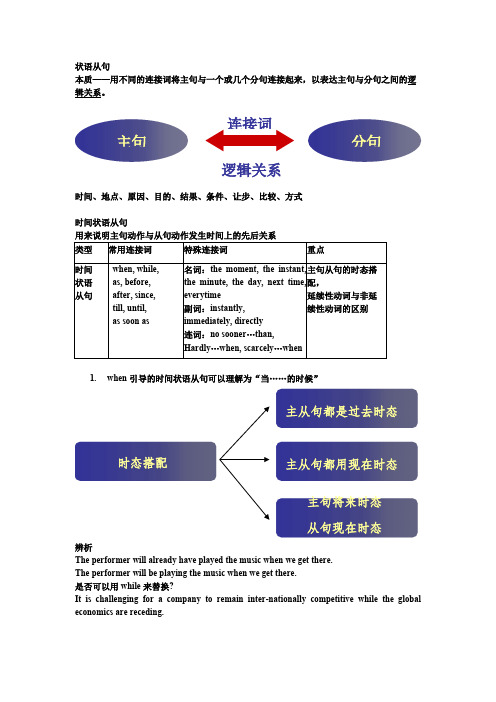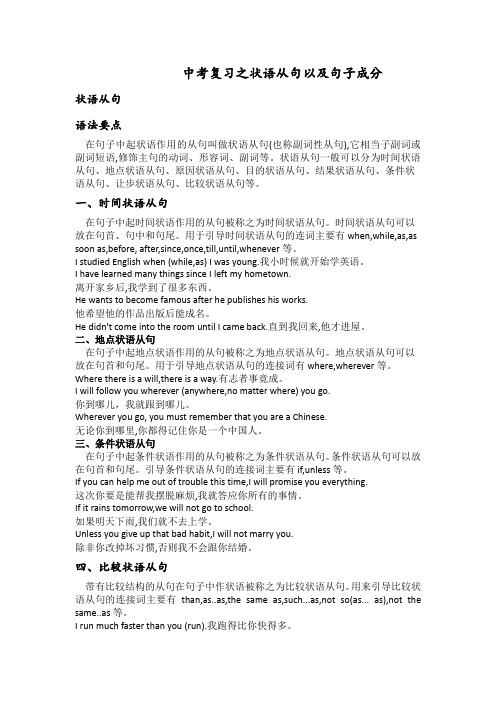原因状语从句和目的状语从句
原因状语从句

原因状语从句Company number:【WTUT-WT88Y-W8BBGB-BWYTT-19998】二、原因状语从句:1、定义:在句中用来说明主句原因的句子叫原因状语从句。
2、常用引导词: because(因为), as (由于), since (既然), now (that) (既然)3、时态:原因状语从句一般都是根据实际情况选用适当的时态。
通常是主过从过,主现从现。
4、because, since和as的区别:1) because引导的原因状语一般放于主句的后面,because从句位于句首时要用逗号分开,放在句末时,可不用逗号分开。
because表示直接原因,语气最强,最适合回答why引导的。
because of 也表示原因,但它后面不接从句, 只能接名词, 代词或动名词。
注意:because 和so 不可同时出现在一个句子里。
①I do it because I like it. = I like it so I do it.②We went by bus because it was cheaper. = It was cheaper so we went by bus.③ He can’t go to school because of his illness.2) since引导的原因状语一般放于主句之前表示已知的、显然的理由(通常被翻译成“既然”= now that ),较为正式,语气比because弱。
①Since you are free today, you had better help me with my mathematics.②Since you don't trust him, you should not employ him.③Now (that) you are grown up, you should not rely on your parents.3) as引导原因状语时表示附带说明的“双方已知的原因”,含有对比说明的意味,语气比since弱,较为正式,位置较为灵活(常放于主句之前)。
状语从句知识点详解(初中英语专项复习)14

状语从句知识点详解(初中英语专项复习)状语从句的概念: 用一个句子作状语来修饰动词和形容词,以表明动作发生或状态存在的时间、地点、原因等,这个句子就叫做状语从句。
状语从句的分类:状语从句共分为九大类,包括:时间、地点、原因、条件、让步、目的、结果、方式、比较状语从句。
下面分别讲解:一、时间状语从句概念:用来表示时间的状语从句,由when, while, as, till, until,before, after, since等引导。
由于时间状语从句的引导词所表示的意思并非一致,不同引导词表达不同的时间,它们在句子中对应的时态、语态等也有所不同。
例如:when /while引导的时间状语从句when引导的从句的谓语动词通常是瞬间动词,也可以是延续性动词。
从句动作可与主语动作通常先后发生也可同时发生。
I was writing when my sister came back.( come是瞬间动词,只能用when引导,不能用while)He often wrote me when/while he studied in Shanghai International Studies University.( study 是延续性动词,while可代替when)While my mother was cooking , I was playing chess with dad. (cook是延续性的动词,cook和play同时发生)I like playing chess while my sister likes reading stories.我喜欢下棋,而我姐姐喜欢看小说。
(while表示对比)when和while的区别还有:while引导的时间状语从句多用于进行时态,而when引导的时间状语从句多用于一般时态。
While we were playing games, our headmaster called me .我们正在做游戏的时候,校长叫我了。
初中英语语法三大从句总结,仅此一份,建议收藏!

在初中英语中,主要有三大从句,即宾语从句、定语从句、状语从句(包括时间、条件、结果、目的、原因、让步、地点、方式等)。
小编今天跟大家分享的就是这三个从句的主要语法点,赶快看起来吧!宾语从句一、定义在句子中起宾语作用的从句叫做宾语从句。
二、连接词that: I think that you can pass the exam.Whether/if: I don’t know what the word means.“Wh”: I don’t know what the word means.I don’t know where he found the book.只用whether的情况:1. 与or not连用:I don’t know whether it’s raining or not.2. 与动词不定式连用:He doesn’t know whether to accept the invitation.3. 连接词前有介词时:It depends on whether he is coming.三、时态1. 主句是一般现在时态,从句根据实际情况而定(各种时态均可)She wants to know what he has done for the exam.2.主句是一般过去时态,从句用相应的过去的时态。
1)She said that she was a student.2)She said that she would fly to Japan in a week.3)She said that she had finished her homework already.3. 如果宾语从句说的是客观真理、自然现象或事实时,这时宾语从句要用一般现在时态。
The teacher said that the earth goes round the sun.一、定义在复合句中修饰名词、代词的从句叫定语从句。
状语从句(原因,目的,时间,地点)

状语从句本质——用不同的连接词将主句与一个或几个分句连接起来,以表达主句与分句之间的逻辑关系。
主句分句连接词逻辑关系时间、地点、原因、目的、结果、条件、让步、比较、方式时间状语从句用来说明主句动作与从句动作发生时间上的先后关系类型常用连接词特殊连接词重点时间状语从句when, while, as, before,after, since, till, until,as soon as 名词:the moment, theinstant, the minute, theday, next time, everytime副词:instantly,immediately, directly 连词:no sooner …than,Hardly…when, scarcely …when 主句从句的时态搭配,延续性动词与非延续性动词的区别1. when 引导的时间状语从句可以理解为“当……的时候”时态搭配主从句都是过去时态主从句都用现在时态主句将来时态从句现在时态辨析The performer will already have played the music when we get there.The performer will be playing the music when we get there.是否可以用while 来替换?It is challenging for a company to remain inter-nationally competitive while the global economics are receding.※when, while, as 用法的区别when 相当于at that time ,引导的状语从句中谓语动词可以是延续性的也可以是非延续性的while ,as 相当于during that time, 引导的状语从句中谓语动词通常是延续性的随着英特网变得日益商业化,网络的使用对商人们非常有利。
2023年牛津译林版英语中考复习之状语从句以及句子成分讲义(1)

中考复习之状语从句以及句子成分状语从句语法要点在句子中起状语作用的从句叫做状语从句(也称副词性从句),它相当子副词或副词短语,修饰主句的动词、形容词、副词等。
状语从句一般可以分为时间状语从句、地点状语从句、原因状语从句、目的状语从句、结果状语从句、条件状语从句、让步状语从句、比较状语从句等。
一、时间状语从句在句子中起时间状语作用的从句被称之为时间状语从句。
时间状语从句可以放在句首、句中和句尾。
用于引导时间状语从句的连词主要有when,while,as,as soon as,before, after,since,once,till,until,whenever等。
I studied English when (while,as) I was young.我小时候就开始学英语。
I have learned many things since I left my hometown.离开家乡后,我学到了很多东西。
He wants to become famous after he publishes his works.他希望他的作品出版后能成名。
He didn't come into the room until I came back.直到我回来,他才进屋。
二、地点状语从句在句子中起地点状语作用的从句被称之为地点状语从句。
地点状语从句可以放在句首和句尾。
用于引导地点状语从句的连接词有where,wherever等。
Where there is a will,there is a way.有志者事竟成。
I will follow you wherever (anywhere,no matter where) you go.你到哪儿,我就跟到哪儿。
Wherever you go, you must remember that you are a Chinese.无论你到哪里,你都得记住你是一个中国人。
状语从句

7.比较状语从句 由than、as…as引导。如: Jim is taller than me. 吉姆比我高。 Lucy jumps as far as Lily. 露茜和莉莉跳得一样远。 8.方式状语从句 由as、as if等引导。如: Please do as I do. 请像我这样做。 She lay down as if she was ill. 她躺着似乎是病了。 9.让步状语从句。 通常由though、although、even if、Whatever等 引导。如: There is air around us, though we can't see it. 我们周围都是空气,尽管我们看不到。
Байду номын сангаас
(改错)
《中考指导》
中考考点2: if表 “是否”引导宾语从句可用将来时. C 考题:I don’t know if he __. If he __ , I’ll tell you. A. will come, will come B. comes, will come C. will come, comes D. comes, come 《中考指导》 中考考点3: “祈使句 + and (or)+ 陈述句” 在意思上相 当 于一个带有条件状语从句的复合句。
中考考点3:※※※while从句用进行时 were readinng e.g.1) My parents _______________ (read) some newspapers while I ____________ (play) with my e-dog this was playing time yesterday.《中考指导》 2) While we ____________ (travel) in were travelling Australia last year, I visited Lucy who once taught English in our school. (上海市2004)
原因、目的和结果状语从句

B.He has so little time that he can’t go to the cinema with you.
(11) 如果主从句的主语相同,并且从句是否定的形式, 可以用too...to...句型转化。 too+形容词/副词+to do
原因状语从句
原因状语从句:从句表示的是主句行为的原因。通 常由because, since, as, for引导。
(1) because表示直接原因(听话人所不知的),语气 最强,引导原因状语从句多放在主句之后。 回答由why提出的问题,只能用because。此外, because和so不能同用在一个句子里。
Speak clearly so that they may understand you. (目的状语从句)
Jack is badly ill so that he has to rest. (结果状语从句)
用于目的状语从句,还有:
so as to…(肯定结构) eg. He got up early so as to catch the early train.
(4) for表示所说的理由是一种补充说明,for引导的从句一 般不放在句子的开头。 如: I decided to stop and have lunch, for I was feeling quite hungry.
Eg: 1. I was late for class yesterday _b_e_c_a_u_s_e there was
例如: He was so excited that he couldn't go to sleep that night. = He was too excited to go to sleep that night.
八种状语从句

八种状语从句状语从句在句中作状语,修饰主句中的动词、形容词和副词等。
按其作用和意义可分为时间、原因、目的、结果、条件、让步、方式、比较八种。
下面对这八种从句的要点加以总结。
一、各类状语从句的引导词及易混词的区别。
1. 时间状语从句1) 引导词(1)表示“当……时候”:when, while, as, whenever(2)表示“一……就……”:as soon as(3)其它:after, before, since, until, by the timeWhenever he comes, he brings a friend. 他每次来都带个朋友。
I want to see him as soon as he arrives. 他一来我就要见他。
I went to bed after I finished my homework. 我做完家庭作业之后才睡觉。
2) 易混引导词when, while, as 的区别when既可指“时间点”,与瞬时动词连用,也可指“时间段”,与延续性动词连用(这时可与while互换)。
如:When he came in, his mother was cooking. 他进来时,他妈妈正在烧饭。
When(While)we were at school, we went to the library every day. 我们在校求学时,每天都到图书馆去。
while 只表示时间段,因此while从句的谓语动词要用延续性动词。
Please don' t talk so loud while others are talking. 别人在工作时,切勿大声讲话。
as 与when 用法相似,但着重强调主句动作与从句动作同时发生,有“随着……”或“一边……一边……”之意。
She sang as she went along. 她边走边唱。
As you get older, you get more knowledge.随着年龄的增长,你获得的知识就越多。
- 1、下载文档前请自行甄别文档内容的完整性,平台不提供额外的编辑、内容补充、找答案等附加服务。
- 2、"仅部分预览"的文档,不可在线预览部分如存在完整性等问题,可反馈申请退款(可完整预览的文档不适用该条件!)。
- 3、如文档侵犯您的权益,请联系客服反馈,我们会尽快为您处理(人工客服工作时间:9:00-18:30)。
• 谓语前常含有may, might, can, could, should, would 等情态动词。
感谢亲观看此幻灯片,此课件部分内容来源于网络, 如有侵权请及时联系我们删除,谢谢配合!
原因状语从句
原因状语
• Afraid oຫໍສະໝຸດ being late, they came by taxi. 因为怕迟 到,所以他们坐出租车来的。
• Thank you for reminding me . 谢谢你提醒我。
• I’ll have to have my watch replaced because there is something wrong with the alarm.
because和because of
• because+ 从句 • because of+ 名词短语
• 他因病不能来。 • He can’t come because he is ill. • He can’t come because of his illness.
Read and combine.
→ Since you do not understand, I will explain again.
目的状语从句
引导词
• so that,in order that等 • “以便”
• I lent him $50 in order that he might go for a holiday. • 我借给他50美元,以便他能去度假。
(1)回答why,只能用because。
A:Why can’t I go? B:__Be_c_au_s_e _ you are too young.
(2)不能将because, since, as等与so连用 。
2. ___A_____ he is ill, ______he cannot come. A. Because, / B. Because, so C. Though, but D. Though, /
• I bought the house simply. • It is large. • → I bought the house simply because it is large.
1.Everybody stays under the tree. It is very hot.
→ As it is very hot, everybody stays under the tree.
引导词
• Because,since,as等
• 语气强弱 • because> since> as
• because不知道原因 • since原因明显,已知 • as双方都知道
• They bumped her off _b_e_c_au_s_e__ she knew too much. • 因为她知道太多,所以他们把她干掉了。
2.The boy couldn’t draw money from the ATM. He forgot the pin.
→ The boy couldn’t draw money from the ATM because he forgot the pin.
3.I will explain again. You do not understand.
• __S_in_c_e you are free today, you had better help me with my mathematics.
• 既然今天你休息, 你最好帮我补习数学。
• _A_s__it is raining, you’d better take a taxi. • 因为在下雨, 你最好乘出租汽车。
